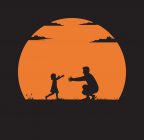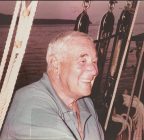Father to Son: The Case to Believe

Our reason is what puts us at the top of the food chain. We are born into this world weak, naked and vulnerable, but reason gives us a tool to exert our mastery over nature. Tweet

Dear Son,
College is the time when you’ll most likely cut down on your Church attendance. You’ll be on your own. I have noticed over the years how you really struggle with waking up on a Sunday. It’s time to wake up. Don’t forget where you come from and where you belong.
As you know, God and thinking are big parts of my life. It was not always the case. When I was your age, my faith was very similar to yours. I was raised in it. I had a sense of what team I was on, but I had other, “worldly,” more pressing concerns. And while you have rarely seen me without a book in my hand, I was not a bookish person when I was your age either.
Our reason is what puts at the top of food chain. Even though we are born into this world weak, naked and vulnerable, our reason has given us a tool to exert our mastery over nature. The fear and trembling of our humble beginnings give way to pride of place.
Here is what I come to think is true.
Human beings are a unique, interesting creature.
We are the only animal on earth with the ability to reason. And at present, it appears we are alone in the cosmos in this regard. Our species has a special insight into the world and its workings. This insight behind the nature of things can do tremendous good and evil—alleviate or cause great pain.
While we have some divine spark in us—“born in the likeness of God”—the Greeks captured the duality of our nature when they described man as a rational animal.
Our reason is what puts us at the top of the food chain. Even though we are born into this world weak, naked and vulnerable, our reason has given us a tool to exert our mastery over nature. The fear and trembling of our humble beginnings has given way to pride of place.
Man is the most dangerous of animals. We are the only species with the capacity to choose between what is good and evil.
Instinct alone doesn’t govern us. Unlike an animal, which is born coded with a full nature completely intact, man has to figure out with his reason what is right, good and joyful. The history of man is the struggle to figure out who we are and what we ought to do next.
If you are honest with yourself, you know first-hand the dangerous flaw in man. There is something wrong in our heads and hearts. Man is unique in that we have a hand in figuring out what is right and wrong and the freedom to act contrary to what we know to be true, good and just. It’s not hard to figure out what is right; it’s just hard to apply it to your own behavior.
Some will say it’s because we are reaching for standards that are too high, demanding and moralistic. The Golden Rule is not that high a reach. We don’t have to ask men to be angels, just not to be a dick or devil to our fellow man.
The truth is in the middle. Son, if you take a philosophy class, remember this before you dive head-first into the shallow end of the pool: the truth is found somewhere between relativism and absolutism. Relativism is bullshit. Man is not the maker and measure of all things. We didn’t create the law of thermodynamics; we simply have the capacity to discover, understand and exploit it for our benefit.
The same is true for ethics. Relativism works well for slobs and sociopaths, so it has a broad popular appeal. Seth Rogan is the stoned, soft end of the relativist spectrum; Hitler is on the sharp, vegan side. (Yes, Hitler was vegan; add that to der fürher’s profound, moral failings.)
We don’t know everything. Our reason has unlocked the secrets of many things, but there is much to life that remains allusive. A truly wise man is modest and humble in light of what he doesn’t know. While I might not actually know which of two peaks covered with clouds is taller, I can rationally discern and defend the profound difference between a mountain and a molehill.
Man is unique in that we have a hand in figuring out what is right and wrong and the freedom to act contrary to what we know to be true, good and just.
Absolutism ignores our natural limits. Absolutism is not modest but instead headstrong in the pursuit of what it deems true. In the name of reason and faith, we have an historical tendency to take things too far. Pious and rational cruelty are permanent parts of the human spirit. One of my favorite quotes on the dangers of absolutism and the overreach it inspires is from Saint Thomas Aquinas: “He who bloweth his own nose too hard draweth blood.”
In short, not everything bad ought to made illegal and prosecuted—we create greater problems in doing so. Prohibition is the classic example. Try to root out the problem of drunkenness and you unintentionally give birth to organized crime.
Aquinas as you might expect was a moral guy who thought human happiness was to be found in getting in sync with God’s plan. However, he understood man’s limitations.
Even good can lead to something bad. Real problems not only arise when we try to root out evil but also when we try to pursue the good. Our faith took an ugly turn during the Spanish Inquisition, as did communism in the name of creating a workers’ paradise on Earth—the latter killed millions.
Christianity’s great contribution to peace was to separate the two kingdoms of God and Man. “Give to Caesar what belongs to Caesar, and give to God what belongs to God.” Christianity’s kingdom was not of Earth. Politics has an integrity and claims that need to be respected. Christians need to live and confront the tensions between the claims of Caesar and of our Creator. Politics governs your body and Christ your soul. Living the tension between these is our lot and challenge in life.
Being a good Christian is not naturally easy for me. Turning the other cheek goes against my fallen grain. When push comes to shove, my natural inclination is push, shove, punch, kick and choke.
The truth of hypocrisy. I have always defended a certain kind of hypocrisy. I am fond of saying, “Hypocrisy is the respect that vice pays to virtue.” A hypocrite says one thing and does another—not good. The goal of character is to have your actions reflect your principles. However, the “virtue” of a hypocrite is he denies the sovereignty of the truth. He refuses to take easy path of relativism and creates principles that reflect and justify his appetites. The hypocrite resists the spirit of our age. While I would rather have my thinking and actions in alignment, I would rather be a struggling hypocrite than a self-satisfied bastard.
I will always struggle to turn the other cheek and forgive. This is the human struggle. This is our cross. Our mixed nature is a drag on our capacity to do the right thing. We know that it’s wrong to lie, cheat and covet, but our natural selfishness has considerable power. The best account of our ingrained selfishness and the dissonance it creates comes from religion. Man is a fallen creature who rebels against his Creator and is redeemed through Jesus’s sacrifice and God’s grace. I am a Christian because it offers key pieces of the human puzzle that are beyond philosophy. The two most notable are love and grace.
Jesus is everything. He paid the wager for our selfishness by dying on the cross. While he was, by Godly nature, an absolute, he was not an absolutist. The emphasis of Jesus is not judgement and punishment rather forgiveness, love and grace. The good news—the Gospel—exists both between and above relativism and absolutism. Love is the answer. We are at our best when we act and think out of love. The good news is our God is a loving god. I can’t help but think and hope He also has a sense of humor, which seems too necessary for lovers of man. Son, don’t lose your faith—make it your own.
Make the right bet. You are gambling man. The secret of gaming is to understand and bet with the odds. Pascal, from whom I have learned much, makes the case for our Christian faith in terms you can easily grasp: if I believe in God and he does not exist, what in the end have I lost? Nothing. If He does exist and I don’t believe what have I lost? Everything. I have wagered my life on God’s existence, mercy and sense of humor. Faith is a leap, but you must jump from solid ground.
I had a special relationship with my grandfather. I asked him on his deathbed what it was like. His answer was profound but tragic: “I have lived my whole life like an ostrich, with regards to my morality, and I am not about to pull my head out now to satisfy your curiosity.”
Be curious always. Philosophy and theology are both about living and dying well. Be curious. I will certainly have many regrets, on my deathbed—I am a mixed lot. I will surely wish I had been a better father, husband, son, citizen, brother and Christian with the time I had been given.
Son, your father is a prodigal son. I think most of us at core are. But remember, whatever happens, you have two fathers who love you always. The love of both appear to be conditional, on the surface. They appear as “Thou Shalt Nots.” But at core, neither can stop loving you.
When I meet my maker, I am not going to ask for God’s judgment rather his mercy. “Forgive me” and “I love you” will get you where you want and need to go. You have a life to live and character to fill out, before judgement. Be curious about what matters.
Love,
Dad







